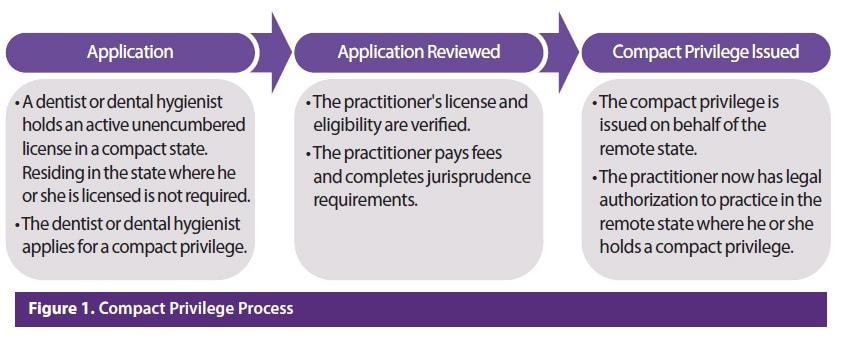
Improving Mobility Through Licensure Compacts
The Dentist and Dental Hygienist Compact facilitates the ability of clinicians to move, expands employment opportunities, and reduces the need to maintain multiple licenses.
License portability is important to many professionals, including dental hygienists. Crossing state lines to obtain employment and improve access to oral healthcare is an obstacle many dental hygienists have faced. Finding solutions to these issues is imperative to successfully address workforce shortages and improve public health.
The American Dental Hygienists’ Association (ADHA) supports licensure portability and has been working diligently to promote initiatives that improve licensure mobility.1 The ADHA maintains the Dentist and Dental Hygienist Compact (DDH Compact) is the best option for license mobility for dentists and dental hygienists. Presently, three states have enacted the DDH compact legislation. The DDH Compact aims to reduce the time it takes for licensed dental hygienists to begin practicing in new states.
Compact Background
Like all licensed professionals, dentists and dental hygienists are limited to providing care within state borders. Interstate compacts are specific to each occupation and can be used by all eligible licensees who meet the requirements within the compact, allowing providers to cross state lines to practice their profession. The rise in compacts, which establish mutual agreement between member states for professional licensure, offer state legislatures an opportunity to safeguard state sovereignty while also ensuring the quality and safety of services.
Since 2016, 289 pieces of licensure compact legislation have been enacted and, to date, 46 states, Washington, DC, and three territories have enacted licensure compact legislation. Fifteen professions currently have a compact available to states for enactment including medicine, nursing, physical therapy, and psychology. In 2023, 54 pieces of compact legislation were enacted, with six new compacts becoming available for states to enact, including the DDH Compact.
The United States Department of Defense (DoD) sought to support the development of interstate compacts to ensure the portability of military spouses with professional licenses. Since military families move often, spouses of military members frequently must navigate the license regulatory systems. DoD wants to ease some of this burden. In September 2020, the DoD entered into a cooperative agreement with the Council of State Governments (CSG) to establish new interstate compacts, strengthening occupational licensing portability. The CSG is a nonprofit organization that serves states. The National Center for Interstate Compacts at CSG has been involved in the creation, implementation, or management of all active licensure compacts.
Formation of the DDH Compact
In collaboration with the DoD, the CSG developed and administered a competitive application process to select the professions for initial compact development. The American Dental Association (ADA) and the ADHA applied together to partner with CSG in the development of a compact for dentists and dental hygienists. The DoD ultimately chose the final professions for compact development, including dentistry. Then, CSG and members from the selected occupations transitioned to drafting the model compact legislation.
To develop recommendations guiding the drafting of a compact, the CSG, ADA, and ADHA brought together a technical assistance group made up of state board members, board administrators, members of professional associations, licensees, and other stakeholders. The group met over the course of several months to determine the needs of the profession and the compact model, mobility patterns, and current licensure systems. A separate, smaller drafting team transitioned the recommendations and model from the technical assistance group into a full draft of the compact model legislation.
Once a draft was written, the CSG managed a public comment period that included educational presentations and an extensive survey process. This review was open to the public. More than 400 comments were received. After gathering responses, the CSG reconvened the drafting and technical assistance group to finalize the draft, leading to the publication of the model legislation in January 2023. An overview of the development process as well as a list of group members who participated in the technical assistance group and the drafting team can be found at ddhcompact.org.
To be eligible to join the compact, states must accept the National Board Examinations of the Joint Commission on National Dental Examinations and the requirement that applicants graduate from a predoctoral dental education program, leading to the Doctor of Dental Surgery or Doctor of Dental Medicine degree, or a dental hygiene education program accredited by the Commission on Dental Accreditation, but they may allow other routes to licensure to remain open.
States must also require the successful completion of a clinical assessment; implement procedures for conducting a criminal background check; require continuing professional development; and pay a participation fee if one is established by the commission. Only two of the 15 active licensure compacts currently assess the state for a fee.
The DDH Compact allows practitioners to practice in multiple states without needing to maintain licensure in multiple states. The practitioner would instead apply for a compact privilege through the compact, which is a much faster and less expensive process than applying for a state license. A dentist or dental hygienist who holds an active unencumbered license in a compact state can apply for a compact privilege. Then, the practitioner undergoes a Federal Bureau of Investigation background check. The practitioner’s license and eligibility are verified, then the practitioner pays the fees, and completes jurisprudence requirements. Upon verification, the practitioner receives a compact privilege and now has legal authorization to practice in the specific state where he or she holds a compact privilege (Figure 1).
 There are requirements for the practitioner using the compact. A dentist or dental hygienist must hold a qualifying license issued by a compact member state; however, the practitioner need not reside in the state. The practitioner needs to pass a national board exam administered by the Joint Commission on National Dental Examinations and graduate from a predoctoral dental education program, or a dental hygiene education program accredited by the Commission on Dental Accreditation. The practitioner must have successfully completed a clinical assessment, met any jurisprudence requirements, and paid applicable fees.
There are requirements for the practitioner using the compact. A dentist or dental hygienist must hold a qualifying license issued by a compact member state; however, the practitioner need not reside in the state. The practitioner needs to pass a national board exam administered by the Joint Commission on National Dental Examinations and graduate from a predoctoral dental education program, or a dental hygiene education program accredited by the Commission on Dental Accreditation. The practitioner must have successfully completed a clinical assessment, met any jurisprudence requirements, and paid applicable fees.
Current Legislative Status of the Compact
States join the compact by passing it through their state legislature and signing it into law by the state governor. Iowa became the first state to sign the compact into law on April 27, 2023. Since then, Washington and Tennessee have enacted the compact. Minnesota, Ohio, Kansas, Pennsylvania, Wisconsin, and New Jersey have each introduced the compact to their state legislatures but, as of November 2023, legislation has not been enacted. New Jersey, Ohio, Pennsylvania, and Wisconsin are states with legislative sessions that last until the end of the year. Legislative sessions for 2023 in Minnesota and Kansas have ended, however, bills can be carried over into the 2024 session.
The compact is enabled following the enactment by seven states. At that point, a commission consisting of one representative from each state will create the rules and the application process. Since the legislation was only just published in early 2023, it is not surprising that seven states have not yet joined. Several state dental hygienists’ associations and state dental societies have expressed interest in their state joining the compact. If your state association is in support of the compact, a representative may submit a letter of support to the CSG at dentalcompact@csg.org to be posted on the compact website.
Conclusion
Interstate compacts are just one of the many strategies states can take to alleviate licensure barriers. The DDH Compact seeks to benefit licensees, including veterans and military spouses, by facilitating mobility, expanding employment opportunities, and easing the burden of maintaining multiple licenses. Active military members and their spouses have the additional benefit of not being required to pay a fee to the commission for a compact privilege.
The DDH Compact is not yet functioning and privileges to practice are not available. The CSG is tracking the introduction and enactment of the compact at ddhcompact.org. The ADHA continues to partner with the ADA and the CSG to support the DDH Compact to improve licensure portability, ease workforce shortages, and provide greater opportunities for dental hygienists to increase access to care and improve population oral health.
Reference
- American Dental Hygienists’ Association. ADHA Policy Manual. Available at: adha.org/wp-content/uploads/2023/09/ADHA-Policy-Manual_FY23.pdf. Accessed December 26, 2023.
From Dimensions of Dental Hygiene. Jan/Feb 2024; 22(1):24-26

